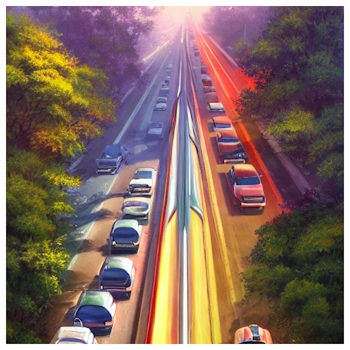
Cyclists don’t make sense to me because even with lanes, with cars driving by, there’s all this carbon monoxide coming out of exhausts and carbon monoxide latches onto hemoglobin faster than oxygen.
I should start with why I’m writing this. This morning, I stopped for coffee before some groceries and noticed a lone Trinidad and Tobago police vehicle following a cyclist on the Trinidad and Tobago version of a highway.
That seemed like a waste of taxpayer money. How many cyclists would be worth it? 3? 7? I don’t know, but 1 police vehicle driving behind one cyclist seems like a waste. On the way to the store, I saw that the group was waiting, and there were about 12 cyclists, so that doesn’t seem like a waste of taxpayer money.
But there were about 16 pickups and cars escorting them. I don’t know who they were. Friends, family, that awkward one night stand from last night who isn’t sure if they’re supposed to be there – all of them driving cars. That’s a lot of gas and diesel to be burning driving around watching spandex covered butts. It seems like joining a yoga class would be a lot less trouble for the same view, but everyone’s different.
In Trinidad and Tobago, there aren’t that many dedicated cyclist lanes. A few decades ago, they made one between San Fernando and Marabella, which no one actually used for a bicycle that I have seen. On an island, it’s hard to add cyclist lanes because there’s not as much space, so that makes sense.
Factor in that without a bicycle lane, traffic forms behind the cyclists which creates more emissions, because when traffic isn’t running smoothly, the accordion effect happens. Every acceleration burns more fuel than a nice, steady speed.
I get the idea of the open road, riding a bicycle as far as a feeling of freedom and self-determination, but when you’ve got more vehicles than cyclists involved, you have to wonder whether cycling is good for the environment. Sure, if there were one car per cyclist, you’re cutting emissions in half per vehicle and yet you’re creating emissions that don’t have to be there. There’s really no environmental argument.
The health argument is one I can roll with, though as this article points out increasing your lifespan 45% by cycling rather than taking the bus can give you the carbon monoxide levels of a smoker. Don’t judge someone who lights a cigarette if you’re cycling in traffic. There’s a fun argument sure to annoy everyone.
I like the idea of cycling, riding a bicycle here and there, but in a tropical country it can be an olfactory disaster wherever you arrive. In Trinidad and Tobago, it makes little sense to me and I know people who ride bicycles and I listen to them talk about it with the same fervor that other hobbyists have. It’s their thing, I get it, and yet…
I don’t get it. If it doesn’t affect other people, it’s no big deal, do whatever you want – but if you’re creating traffic and spending taxpayer’s money, it is affecting other people. Some countries have the bicycle paths, some don’t. Some have trails, some don’t. Cycling ain’t the same everywhere.
I don’t have an answer. I don’t want to say cyclists should stop cycling, yet I also would like to see it practical.

